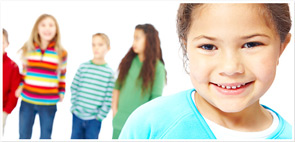

 Pediatric Dentistry
Pediatric Dentistry Your child's first visit to the dentist should be a positive and enjoyable experience. Children are not born naturally fearing visits to the dentist office, but an unknown environment can definitely be fearful. Our family pediatric dentistry office strives to make your child feel calm and at ease during their visit, as we use pleasant and simple language to describe our treatments to our young patients. From the moment your child steps into our office, our efforts are to put them at ease, to establish and develop trust, and to educate them as much as possible about their visit, so they won't fear the unknown..
It is recommended in Canada that children visit the dentist by their first birthday. By this time, their newly erupted teeth will need to receive proper dental care and hygiene on a regular basis. When you child's teeth erupt Your children’s first "baby teeth", or primary teeth, generally begin to erupt at the age range between 6-12 months. These primary teeth continue to erupt up until about age 3. Throughout this time, your child’s gums can experience tenderness and soreness. To help alleviate your child's discomfort, you can help soothe their gums by rubbing a clean finger or a cool, wet cloth across them. An additional option is to use a teething ring. Your child should have 20 primary teeth when they have finished teething.
Your children’s primary teeth will be shed at various times throughout their childhood, with their permanent teeth beginning to erupt at approximately age six, with new teeth erupting continuing all the way until age 21. In most cases adults will have 28 permanent teeth, 32 teeth when including wisdom teeth.
 Brushing
Brushing After your child’s primary teeth first erupt, make sure that you examine them every two weeks, keeping an eye out for any lines or discoloration that may be caused by decay. Keep in mind that that sugary foods or liquids can attack teeth, so please ensure that your child brushes their teeth after eating or feeding. For optimum children's oral hygiene, we advise brushing four times a day: after breakfast, after lunch, after dinner, and at bedtime. When your child is too young to brush for themselves, you should brush their teeth for them with a soft-bristled toothbrush and a pea-sized amount of toothpaste. For children younger than two, do not use fluoride toothpaste unless advised to do so by Dr. Chan. Be sure to review proper teeth brushing procedures with your child. Make it fun for them, and they will keep the habit for a lifetime.
Flossing is also essential for oral hygiene for children, and Dr. Calvin Chan will discuss with you the right time to start flossing. If you notice any signs of decay, contact Dr. Chan immediately.
You can help your children keep prevent tooth decay with proper brushing and flossing routines combined with regular visits to the dentist. Your children should visit the dentist every six months for regular checkups and dental cleanings.